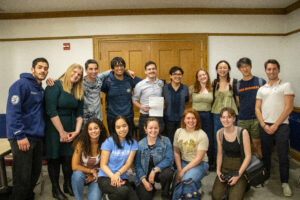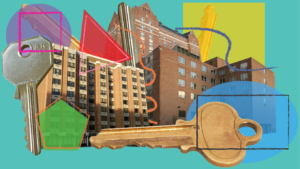Resident Assistants (RAs), old and new, arrived on campus in mid-August for their yearly training before the new semester. But this year, training came with several changes to Residential Living policies that could affect the newly unionized RAs’ work schedules and on-campus residential life.
One of the most notable revisions to RA policy includes the way that RAs cite minor infractions. Previously, an informal warning process addressed violations. RAs would give a verbal warning to students after the first minor infraction and cite them after the second. RAs were still mandated to report these instances to the university, though no citation process would occur.
The new policy requires all RAs on duty to file incident citations for both student conduct and community living expectation violations without an initial warning or report to the university. These violations can range from alcohol possession to noise complaints.
“Typically, in the past, if someone called the RA on duty and was like, ‘Hey, someone’s being really noisy,’ you could just go over and tell them to be quiet,” said an RA in the Southwest Quad, who spoke to the Voice on the condition of anonymity out of fear of employment repercussions. “Now they’re kind of requiring that we file an incident report for that.”
For residents, the changes could make it more likely that they receive a formal citation, but the new process doesn’t guarantee any particular disciplinary action from the university.
“Whether that actually results in something is not up to us at all, and it’s not anything that we have any control over,” Ria Maheshwari (CAS ’26), a third-year RA, said.
According to the university, the policy changes came after a reassessment of policies at the beginning of this year.
“The beginning of the academic year provides us with the opportunity to ensure that our policies and procedures reflect current best practices to serve the needs of our students, staff, and community,” a university spokesperson said. “Our goal is to foster intentional communities that nurture individual growth, encourage reflection, and promote holistic well-being.”
Some RAs are worried about the effect the new citation rules could have on their relationship with their residents.
“Where the real challenge is coming up is in us having to execute that plan for a student body that is either uninformed or misinformed about it,” said CC Mesa (SFS ’26), organizing lead for the Georgetown Resident Assistant Coalition (GRAC). “There’s a disconnect, which is frustrating because it makes RAs seem like the bad guys.”
Changes to RAs’ holiday schedules also caused concern for many returners.
Before this year, each residential community was assigned a partner building for holiday breaks, meaning that fewer RAs had to remain on campus to work. Now, RAs’ residential communities are limited to the same building throughout the entire year, meaning more RAs are expected to be on duty—and on campus—during Thanksgiving and spring break.
“I know it’s already created a lot of anxiety, especially because holiday duty is something that everyone prefers to figure out at the beginning of the year,” Izzy Wagener (SFS ’26), chairperson of GRAC, said. “If you talk to any student who has stayed here over the holidays, it’s not a situation that people want to be in, because it is really hard to be away from family.”
RAs are unsure of the reasoning behind the change, though some suggested it stems from a portion of GRAC’s contract, which was ratified unanimously in May, stating that an RA cannot work outside their assigned residential community. However, some RAs ratified the contract under the assumption that long-standing practices—such as holiday building assignments—would continue.
“Everybody said, ‘Yes, right. Let’s do this. Let’s ratify this contract,’” Mesa said. “If it had been clear in our bargaining agreement that this standard practice could be interpreted as null and void, I don’t think RAs would have voted unanimously for it.”
Some RAs contend that this change directly conflicts with the terms set in their contract with Georgetown, which says that the university must first notify GRAC of any changes so they can be properly negotiated.
“The university is not supposed to make these drastic changes to our working conditions without first bargaining over them,” Wagener said. “I consider this to be a drastic change to our working conditions that should have been bargained.”
The university stated that they remain in consistent communication with RAs about policy changes.
“We regularly engage with RAs and their union in accordance with the collective bargaining agreement, which provides a forum for union and university representatives to come together and discuss issues of mutual interest and concern,” a university spokesperson said.
Others question the necessity of this new policy, citing that shifts on the average holiday duty are uneventful.
“I feel like they’re using some vague contract language to basically make all of the RAs do something unnecessary,” Wagener said. “As any RA who’s been on holiday duty will tell you, we very rarely get calls during that time because there are very few students on campus.”
Wagener expressed concern about whether the policies will affect how many RAs return to the position in the coming years.
Other Residential Living policy changes affect Community Directors (CDs), who supervise RAs. For instance, the number of CDs on duty was increased from one to two each night.
“That’s going to affect RAs because our CDs are going to be overworked and stressed and unable to take more time off,” Mesa said.
With a high turnover rate, increased hours, and multiple new CDs, veteran RAs are worried about finding support from their supervisors in navigating campus policy.
“These CDs who are starting a new job, they don’t really understand what their responsibilities are,” Wagener said. “There have been multiple times where CDs have just told me information that I know to be incorrect based on Res Living’s own operations.”
Despite notable changes to their policies, RAs did not learn about these developments until they arrived on campus, according to the four RAs who spoke with the Voice. The RAs said they learned about the new warning system from individual CDs rather than administrators.
“There was no RA-wide communication,” Wagener said.
RAs first heard about the other policy changes at their training sessions the week before move-in.
“We as RAs specifically are not really made aware of those changes until they are done and we are given our presentation on the code during training,” Mesa said.
Union leaders say they are working to get in contact with Residential Living to discuss the changes, but it’s been a slow process. Mesa said it’s been difficult to get responses, particularly productive ones, so far. Even so, the RAs said they’re committed to advocating for themselves.
“It’s not loud because it’s me and Izzy [Wagener] who are particularly impassioned. It’s loud because behind our voices are the voices of the rest of the RAs,” Mesa said. “We are not asking for total shifts happening here. We are just asking to meet.”
Despite the challenges, Maheshwari explained that she is continuing in her role as she would have before.
“I try not to let it affect how I perceive my role, just because I’ve always thought about myself as an RA who is a friend first, a mentor first, a resource first, and some sort of authoritative figure second,” Maheshwari said.
Editor’s note: Izzy Wagener is a contributing editor for the Voice and previously served as the newsmagazine’s photo editor.
Editor’s note: This story has been updated to clarify the informal reporting process.







